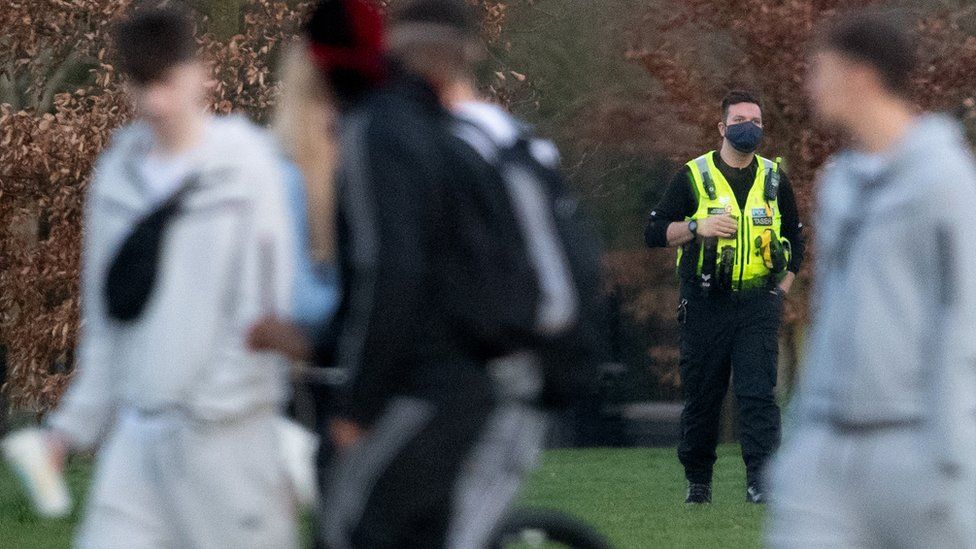Lockdown fines: Fixed penalty notices should all be reviewed - MPs
- Published

All fixed penalty notices for Covid lockdown breaches, which can be as high as £10,000, should be reviewed - according to a parliamentary committee.
The system is "muddled, discriminatory and unfair", MPs on the Joint Committee on Human Rights argued.
More than 85,000 fixed penalty notices have been issued in England since the pandemic began, and 8,000 in Wales.
A government spokesperson said it was right there were consequences for those who most flagrantly breached the rules.
The JCHR, which is made up of MPs and peers, said it had "significant concerns" about the validity of fines, the inadequacy of the review and appeal process, the size of the penalties and the criminalisation of those who could not afford to pay.
"The whole process disproportionately hits the less well-off and criminalises the poor over the better off," said committee chairwoman Harriet Harman.
While the committee recognised swift action had been needed in the face of the pandemic, the government needed to ensure rules were clear, enforcement was fair and that mistakes could be rectified, she said, adding: "None of that is the case in respect of Covid-19 fixed penalty notices."
Ms Harman said police had a difficult job enforcing the rules during the pandemic, but warned a "lack of legal clarity" meant there could be a large number of wrongly issued fines.
The Labour MP added: "This means we've got an unfair system - with clear evidence that young people, those from certain ethnic minority backgrounds, men, and the most socially deprived, are most at risk.
"Those who can't afford to pay face a criminal record along with all the resulting consequences for their future development."
Have you been issued with a lockdown fine? Please share your experiences by emailing haveyoursay@bbc.co.uk.
Please include a contact number if you are willing to speak to a BBC journalist. You can also get in touch in the following ways:
- WhatsApp: +44 7756 165803
- Tweet: @BBC_HaveYourSay
- Please read our terms & conditions and privacy policy
Those given fixed penalty notices by police mean people can either pay a penalty - between £200 and £10,000 - or opt to face a criminal prosecution.
According to the report, coronavirus rules have changed at least 65 times since March 2020.
"It is possible to tell from penalties that have not been paid and have then progressed through the system towards a prosecution, that a significant number of FPNs are incorrectly issued," the committee said.
It highlighted a Crown Prosecution Service review of prosecutions under coronavirus regulations which found in February that 27% of the defendants had been incorrectly charged.
In January, two women received an apology and had their fines waived after being given fixed penalty notices after driving to a Derbyshire beauty spot for exercise.
Police were 'aggressive and overbearing'
A solicitor's daughter received a fixed penalty notice (FPN) in March while in halls of residence at the University of Nottingham.
Jane, who did not want to share her surname, told the BBC her daughter was visiting another flat for a "get together" with eight others.
She said all nine had previously tested positive for Covid-19 and were "playing cards and listening to smooth jazz".
Then the police entered the flat shouting "where is everyone?", according to Jane.
She said they were "aggressive and overbearing".
Those who did not live in the flat then returned to their own residences - but were still issued with £100 fines, rising to £200 if paid late.
Jane said: "[The police] did not at any time follow the National Police Chiefs' Council guidance to 'engage, explain, encourage, enforce'."
Jane paid the £200 fine and has now requested a review by Nottinghamshire Police, but is yet to hear back.
Nottinghamshire Police Chief Constable Craig Guildford said the force had a duty to protect the public "and this was clearly an illegal gathering taking place in halls of residence, where dozens of other students live as well".
He said that police have followed the four Es of approach of engaging, explaining, encouraging and then enforcing as a last resort throughout most of the first year of the pandemic.
And he added: "By now the laws around Covid can come as a surprise to no one - and where people are blatantly or repeatedly holding parties or going to parties outside their own home they really shouldn't be shocked to be given a fine."
- IS THE PRISON SYSTEM FAILING?: Josie Bevan, 'prison wife', explores the repercussions of incarceration
- PLAYING PATRICIA CARMICHAEL: Obsessed with... Line of Duty discuss Sunday's episode!
Related Topics
- Published25 February 2021
- Published28 January 2021
- Published12 January 2021
- Published12 January 2021
- Published10 January 2021